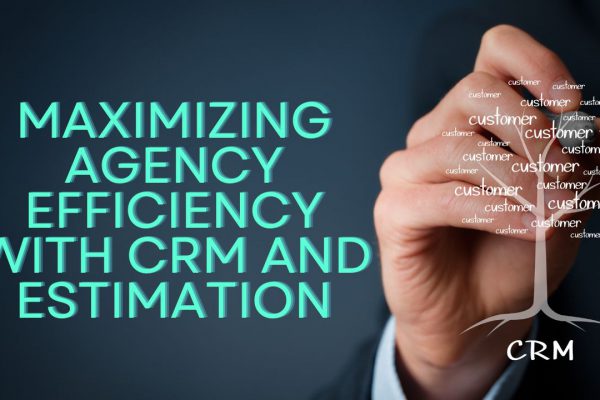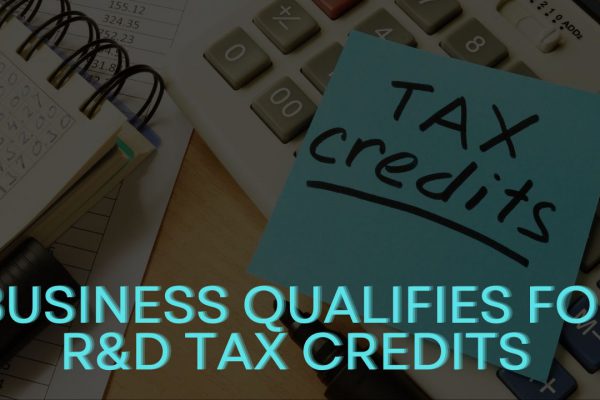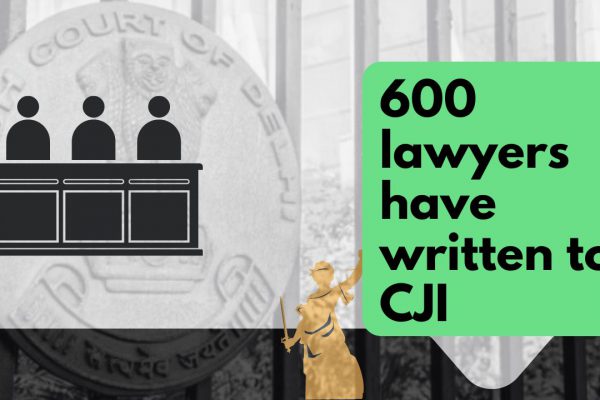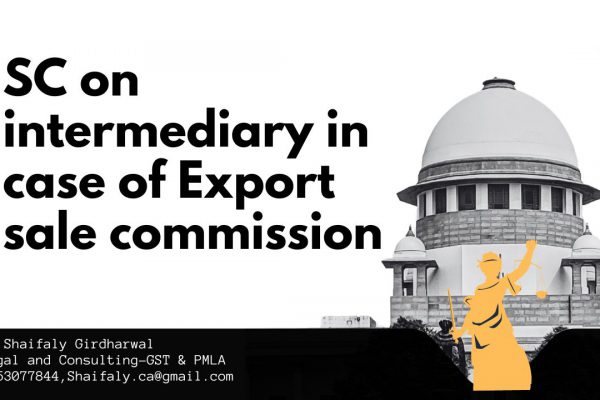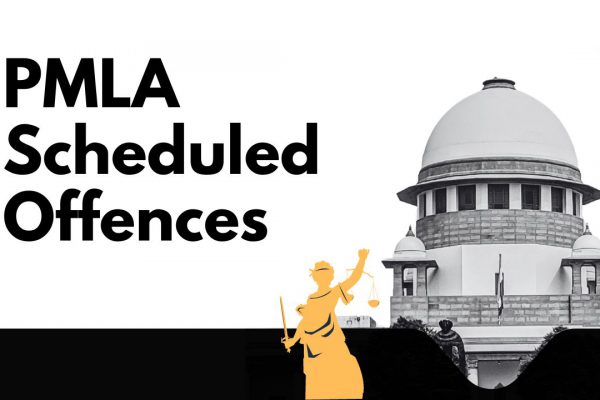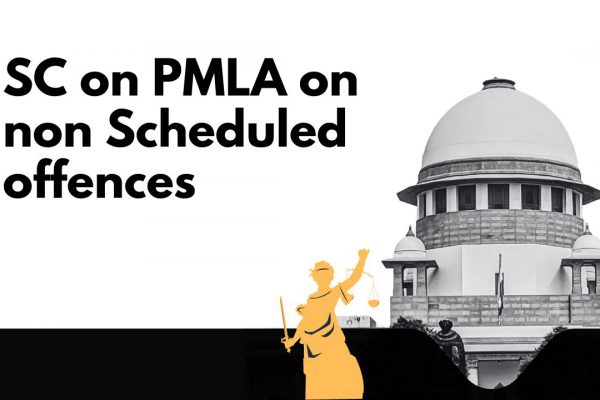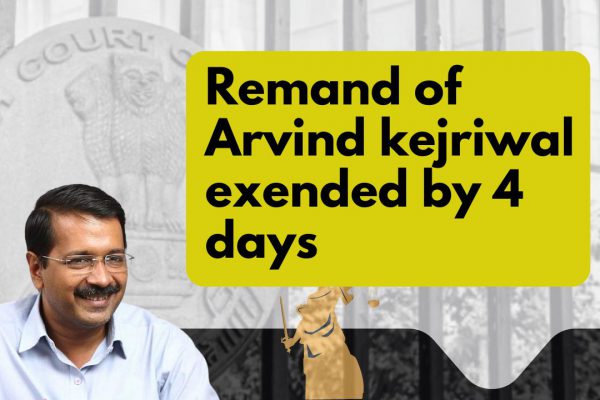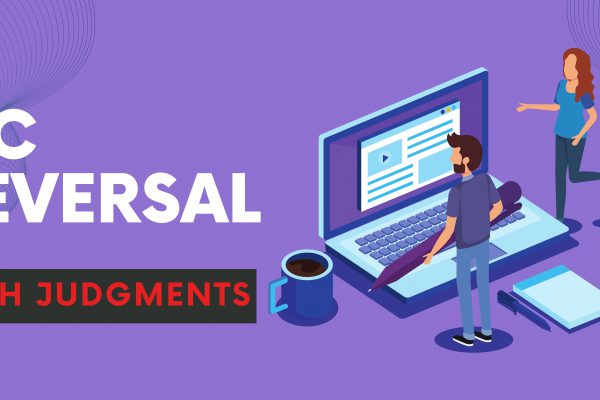334th Issue: 23rd January 2022- 29th January 2022
EDITORIAL
GST on transactions between Head office and Branch office has been a contentious issue since the inception of GST as the said transactions were not liable to any tax under the pre-GST regime. A recent ruling by the Appellate Authority for Advance Ruling (AAAR) says allocation of salary of a head office employee to a branch, and its recovery from there will be subject to GST.
The Applicant had approached the AAAR with questions including whether the allocation of the cost of employees’ salary by the head /corporate office to a branch would attract GST. It had also sought clarity over the applicability of GST on allocation and recovery of the salary cost of head office’s employees from the branch offices.
The Maharashtra AAAR ruled that both the above-mentioned services will be subject to GST. The ruling also said the head office is not entitled to avail of the tax credit on tax paid on common services. It is evident that the employees of the Appellant’s Head Office are working at the behest of the Head Office, and not at the behest of the Branch Offices/Units.
Further, the Head Office is using all its human resources to facilitate the operational requirements of the Branch Offices/Units by way of procuring common input services on behalf of the Branch Offices/Units. Thereby, providing the impugned facilitation services, therefore, allocation and recovery of any amount including its employee’s salary cost from the Branch Offices/Units will be subject to GST – the impugned transaction of facilitation services are not effected between the employees and the employer, but between the Head Office and Branch Offices/Units. which are distinct units in terms of Section 25(4) of the CGST Act, 2017, and the same is clearly taxable under GST in terms of Section 7 of the CGST Act, 2017. Hence the allocation and recovery of the salary of the employees of the Head Office from the Branch Office/Units will be subject to GST.
The input tax credit is essentially a mechanism whereby GST paid on particular raw material or input services can be partially set off against future tax liability. Under the GST framework, organizations have to take separate registration in each state and split all expenses. For an organisation, there are certain expenses common to the whole organisation – such as advertising, paying lawyers, or even travel expenses incurred by the CEO or other top executives. The question for several organizations is how to split them and in what proportion.
There is a mechanism called Input Service Distributor (ISD). Organizations can take ISD registration and distribute the input tax credit across all registrations.
SYNOPSIS
| S.NO. | TOPICS | PAGE NO. |
| 1] | TAX CALENDAR | 4 |
| 2] | INCOME TAX | 5 |
| NOTIFICATION | Amendments in securities transactions tax rules 2022 | |
| 3] | GST | 6 |
| CASE LAW | CLAIM AND AVAILMENT OF BOGUS ITC ON THE BASIS OF FAKE INVOICES BY CREATING AND OPERATING FICTITIOUS FIRMS – OFFENCES UNDER SECTIONS 132(1)(b),(c)&(l) OF THE CGST ACT – AMIT AGARWAL VERSUS STATE OF ODISHA AND ANOTHER | |
| 4] | FEMA | 7 |
| DISCUSSION | INVESTMENT IN IMMOVABLE PROPERTY OUTSIDE INDIA | |
| 5] | CUSTOMS | 8 |
| NOTIFICATION | ExemptION OF BCD and IGST on goods imported for the purpose of AFC Women’s Asian Cup India, 2022 | |
| 6] | DGFT | 9 |
| PUBLIC NOTICE | INCLUSION OF PARAGRAPH 2.79G IN THE HANDBOOK OF PROCEDURES OF THE FOREIGN TRADE POLICY (FTP) 2015-20 TO NOTIFY THE PROCEDURE FOR GENERAL AUTHORISATION FOR EXPORT OF CHEMICALS AND RELATED EQUIPMENT (GAEC) | |
| 7] | GST PLEADING AND PRACTICE: WITH SECTION-WISE GST CASES & GST NOTICES AND THEIR REPLIES | 10 |
| 8] | LET’S DISCUSS THIS FURTHER | 11 |
TAX CALENDAR
| Due Date | Form/Return/Challan | Reporting Period | Description |
| 24th January | GSTR -3B | December 2021 | Summary of outward supplies, ITC claimed, and net tax payable by taxpayers who have opted for the QRMP scheme and registered in category B states or UTs. |
INCOME TAX
NOTIFICATION
Amendments in securities transactions tax rules 2022
OUR COMMENTS: The Central Government vide Notification No.9/2022 dated 18th January 2022, hereby makes the following rules to amend the Securities Transaction Tax Rules, 2004, namely:─
- These rules may be called the Securities Transaction Tax (1st Amendment), Rules,2022.
- In the Securities Transaction Tax Rules, 2004(hereinafter referred to as the principal rules), after rule 5, the following rule shall be inserted, namely:-
“ 5A.A person is responsible for the collection and payment of securities transaction tax in the case of the Insurance Company.- In the case of an insurance company, the person responsible for collection and payment of securities transaction tax in accordance with sub-sections (2), (3), and (4) of section 100 of the Act, shall be the managing director or a whole-time director, as defined in clauses (54) and (94) of section 2 of the Companies Act, 2013 (18 of 2013), duly authorised by the Board of Directors of such company in this behalf.”.
- In the principal rules, for rule 6, the following rule shall be substituted, namely: –
“ 6. Payment of securities transaction tax.- Every recognised stock exchange, or the trustee of every Mutual Fund or such other person managing the affairs of the mutual fund as may be duly authorised by the trustee in this behalf, or the managing director or a whole-time director, as defined in clauses (54) and (94) of section 2 of the Companies Act, 2013 (18 of 2013), duly authorised by the Board of Directors of an insurance company, who is required to collect and pay securities transaction tax under section 100 of the Act, shall pay the amount of such tax to the credit of the Central Government by remitting it into any branch of the Reserve Bank of India or of the State Bank of India or of any authorised bank accompanied by a securities transaction tax challan.”.
- In the principal rules, in rule 7, –
(i) in sub-rule (1), after clause (b), the following clause shall be inserted, namely:-
“ (c) in the case of an insurance company, be in Form No. 2A and be verified in the manner indicated therein.”;
(ii) for sub-rule (2), the following sub-rules shall be substituted, namely:-
“(2) The return in Form No. 1, Form No. 2 and Form No. 2A referred to in sub-rule (1) shall be furnished electronically either under digital signature or electronic verification code.
(2A) The Principal Director-General of Income-tax (Systems) or Director-General of Income-tax (Systems) shall specify the procedures, formats, and standards for ensuring secure capture and transmission of data and shall also be responsible for evolving and implementing appropriate security, archival, and retrieval policies in relation to furnishing the returns in Form No. 1, Form No. 2 and Form No. 2A.”;
(iii) after sub-rule (3), the following sub-rule shall be inserted, namely:-
“(3A) In case of an insurance company, the return referred to in sub-rule (1) shall be furnished by the managing director or a whole-time director, as defined in clauses (54) and (94) of section 2 of the Companies Act, 2013 (18 of 2013), duly authorised by the Board of Directors of such company in this behalf.”.
- In the principal rules, in rule 8, after clause (b) the following clause shall be inserted, namely:-
“(c) in the case of an insurance company by the managing director or a whole-time director as defined in clauses (54) and (94) of section 2 of the Companies Act, 2013 (18 of 2013) a duly authorised by the Board of Directors of such company in this behalf.”.
- In the principal rules, in the APPENDIX, Form No. 2A- Return of Taxable Securities Transactions for Insurance Company has been inserted.
GST
CASE LAW
Claim and availment of bogus itc on the basis of fake invoices by creating and operating fictitious firms – offenses under sections 132(1)(b),(c)&(l) of the cgst act – Amit Agarwal versus the state of Odisha and another.
Brief: Input Tax Credit claim and availment of bogus ITC on the basis of fake invoices by creating and operating 13 fictitious firms – offenses under sections 132(1)(b), (c)&(l) of the CGST Act.
Our Comments: It has been held by the Hon’ble Orissa High Court that, as per the materials on record, the petitioner allegedly obtained GST registration vis-à-vis the fake business concerns in collusion with other accused persons by utilizing and forging the personal identity documents of the so-called proprietors. The nature and extent of involvement of the petitioner with regard to the alleged transactions are clearly evident and figured out from the materials on record. In so far as the offense under Section 132 OGST Act is concerned, it is in relation to GST fraud alleged to be for an amount of ₹ 319.64 crores, wherein, the petitioner is said to be involved by creating and operating fictitious business entities in the names of persons having no means.
As a consequence, bogus ITC was availed by the business establishment for whom he worked as a Chartered Accountant with the allegation of joint liability.
Whether it is a case of the petitioner facilitating the bogus ITC being availed is to be dealt with and adjudicated upon during and in course of the trial.
The GST authorities have managed to find out the alleged fraud being perpetrated towards availing fake ITC by creating bogus business entities and it appears to be an act which apparently makes all the accused persons jointly and severally liable – Having regard to the nature of involvement and the specific role which is claimed to be a Chartered Accountant and his period of detention of four months and the fact that sufficient materials have already been collected and as the prosecution now primarily depends on documentation and related evidence and for that, tampering with the evidence seems to be remotely possible, the Court, being aware of the settled position of law applying to the subject matter, is inclined to release the petitioner on bail subject, however, to stringent conditions stipulated.
The petitioner is directed to be released on bail on fulfillment of conditions imposed – bail application allowed.
FEMA
DISCUSSION
Investment In Immovable Property Outside India
OUR COMMENTS The RBI has come out with the Foreign Exchange Management (Acquisition and Transfer of immovable property outside India) Regulation, 2015 through Notification No. FEMA 7(R)/2015-RB dated January 21, 2016, for the regulations governing acquisition and transfer of immovable property outside India.
It is to be noted that the extant regulation provides that a person resident in India is permitted to acquire property outside India subject to the above RBI Regulations and if so permitted.
- These restrictions, however, do not apply to the property held by a person resident in India, who is a foreign national;
- or if the property was acquired by a person resident in India on or before July 8, 1947, and continued to be held by him with the permission of RBI.
- These restrictions also do not apply to the acquisition of property outside India by a person resident in India on a lease not exceeding five years.
Acquisition and transfer of any immovable property outside India by a Person Resident in India(PRI) would require prior approval of RBI except in the below-mentioned cases;
- Property held outside India by a Foreign Citizen Resident in India;
- Property acquired by a person on o before July 8, 1947, and held with the permission of RBI;
- Property acquired by way of gift or inheritance from;
- a) Persons referred to (ii) above;
- b) Persons referred to in Section 6(4) of the FEMA, 1999.
According to Section 6(4) of the FEMA,1999; a person resident in India can hold, own, transfer or invest in any immovable property situated outside India if such property was acquired, held, or owned by him/ her when he/ she was resident outside India or inherited from a person resident outside India. It has been clarified that Section 6(4) of FEMA, 1999 covers multiple following transactions:
- Foreign currency accounts were opened and maintained by such a person when he was resident outside India;
- Income earned through employment or business or vocation outside India taken up or commenced while such person was resident outside India, or from investments made while such person was resident outside India, or from gift or inheritance received while such a person was resident outside India;
iii. Foreign exchange including any income arising therefrom, and conversion or replacement or accrual to the same, held outside India by a person resident in India acquired by way of inheritance from a person resident outside India.
A person resident in India may freely utilize all their eligible assets abroad as well as income on such assets or sale proceeds thereof received after their return to India for making any payments or to make any fresh investments abroad without approval of Reserve Bank, provided the cost of such investments and/ or any subsequent payments received, therefore, are met exclusively out of funds forming part of eligible assets held by them and the transaction is not in contravention to extant FEMA provisions.
CUSTOMS
NOTIFICATION
exemptION OF BCD and IGST on goods imported for the purpose of AFC Women’s Asian Cup India, 2022
OUR COMMENTS: The Central Government, vide Notification No. 1/2022 dated 18.1.2022, on being satisfied that it is necessary for the public interest so to do, hereby exempts the goods of the description specified in column (2) of the Table below and falling under the First Schedule to the Customs Tariff Act, 1975 (51 of 1975), when imported into India by All India Football Federation for the purpose of organizing the AFC Women’s Asian Cup India, 2022, from the whole of the duty of customs leviable thereon which is specified in the said First Schedule and from the whole of the integrated tax leviable thereon under sub-section (7) of section 3 of the said Customs Tariff Act, subject to the conditions specified in the corresponding entry in column (3) of the said Table.
| S. No. | Items | Conditions |
| (1) | (2) | (3) |
| 1. | The following goods:
i. Kelme Referee kits, ball boy uniform, and match-day bibs ii. Competitions goods shipped using Aramex iii. Molten official match balls iv. Kelme AFC delegations/volunteers attire v. Country Flags vi. Sleeves Badges vii. WAC mini-Trophy |
a) The importer, at the time of clearance of the goods, produce a certificate to the Assistant Commissioner of Customs or Deputy Commissioner of Customs as the case may be, from the Director or Deputy Secretary (Sports), Department of Sports, the Ministry of Youth Affairs and Sports, Government of India, indicating that the said goods are required in relation to the AFC Women’s Asian Cup India, 2022.
b) The importer, at the time of clearance of the goods, furnishes an undertaking that, – i. all such goods, excluding gift items, souvenirs, mementos shall be re-exported within three months from the date of conclusion of AFC Women’s Asian Cup India, 2022. ii. a utilization certificate for the goods consumed shall be furnished from the Director or Deputy Secretary (Sports), the Department of Sports, the Ministry of Youth Affairs and Sports, Government of India, within three months from the date of conclusion of AFC Women’s Asian Cup India, 2022. |
DGFT
PUBLIC NOTICE
PROCEDURE FOR GENERAL AUTHORISATION FOR EXPORT OF CHEMICALS AND RELATED EQUIPMENT (GAEC)
OUR COMMENTS: The Foreign Trade Policy (FTP) 2015-20, vide Public Notice – 45_2015-20 dated – 13.01.2022, hereby makes an amendment to Handbook of Procedures (HBP) of FTP 2015-20 for inclusion of new entry at Paragraph 2.79G with immediate effect.
- After Sub Para 2.79F of the HBPof FTP 2015-2020, a new entry shall be inserted as under:
“2.79G – General Authorisation for Export of Chemicals and related equipment (GAEC) under SCOMET List
- Procedure for grant of General Authorization for Export of Chemicals and related equipment (GAEC)
- In respect of export/re-export of SCOMET items under the Categories / Sub Categories of 1C, 1D,1E, 3D001, and 3D004 (excluding software and technology), the applicant exporter shall submit an application for GAEC through online SCOMET portal and attach the information in proforma -ANF 2O;
- The application would be reviewed/examined for the issuance of GAEC by the Inter-Ministerial Working Group (IMWG) based on the submitted application and other supporting documents submitted by the applicant exporter in the prescribed proforma including various sub-points.
- Post reporting for export / re-export of items under GAEC
- The Indian exporter shall submit post-shipment details of each export/ re-export of SCOMET items under the above Categories/ sub-categories under GAEC, as mentioned above at II.c. (i) and within the timelines specified therein;
- Failure to do so may entail the imposition of penalty and/or suspension/revocation of GAEC.
- Record Keeping
The exporter will be required to keep records of all the export documents, in manual or electronic form, in terms of para 2.73 (c) of HBP, for a period of 5 years from the date of GAEC issued by DGFT.
- General Conditions & Exclusions
- GAEC would riot be issued in case of items to be used to design, develop, acquire, manufacture, possess, transport, transfer, and/or used for chemical, biological, nuclear weapons or for missiles capable of delivering weapons of mass destruction and their delivery system;
- GAEC would not be issued for countries or entities covered under UNSC embargo or
sanctions list or on assessment of proliferation concerns, or national security and foreign policy considerations, etc.;
- IMWG shall reserve the right to deny the issue of GAEC without assigning any reason(s).
- Validity
- GAEC issued for export / re-export of SCOMET items under the above Categories / Sub Categories (excluding software and technology) shall be valid for a period of five years from the date of issue of GAEC subject to subsequent post reporting(s) on a quarterly basis to be reported within 30 days from the last quarter;
- GAEC cannot be revalidated in terms of Paragraph 2.80 of HBP of FTP 2015-20.
- Suspension / Revocation GAEC issued shall be liable to be suspended/revoked by the DGFT on receipt of an adverse report on proliferation concern or for non-submission of mandatory post-shipment details/reports/documents within the prescribed timelines or for non-compliance with the conditions of the proposed policy.
If you already have a premium membership, Sign In.
 CA Vivek Jalan
CA Vivek Jalan
Vivek Jalan, from Tax Connect, is a Chartered Accountant & a qualified L.LM & LL.B. He is The Chairman of The Ease of Doing Business Committee therein. He is a member of The Confederation of Indian Industries (CII)- Economic Affairs & Taxation Committee. He is the Member of The Consultative Committee of The Commissioner of SGST. He is also The Member of The Regional Advisory Committee of The Chief Commissioner of CGST. He is advising Large MNCs, PSUs & PAN India Organizations in GST & Income Tax and has offices in Kolkata, Delhi, Bangalore, Mumbai & now Surat. He is a regular Columnist and guest expert in Economic Times, Times of India, Dalal Street Journal, Money Control, Live mint, CNBC, Hindustan Times, Zee Business, Financial Express, other dailies, and business magazines like Business Today, etc. He is also a guest expert on Taxation matters in All India Radio and other media platforms. He is the Editor of Weekly Bulletin TAX CONNECT, a publication on Indirect Taxes and Direct Taxes which reaches more than 70000 professionals.



